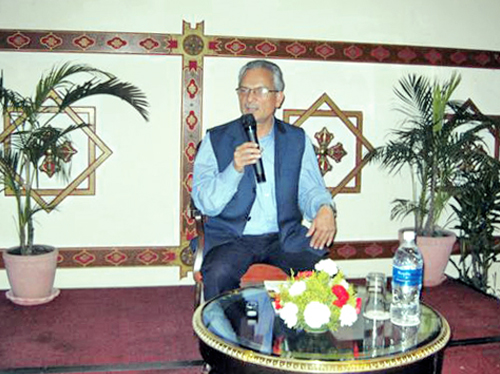Bhattarai draws flak as he bats for socialism
Kathmandu, October 2
Former prime minister Baburam Bhattarai, who quit the Unified Communist Party of Nepal-Maoist several days ago, today drew the private sector’s criticism, as he said the new political platform that he was planning to create would have ‘socialistic orientation’.
Bhattarai, who has also served as the finance minister and is known as the champion of the road expansion drive in Kathmandu, said he was forming new political platform to launch ‘economic revolution’.
“The political revolution that continued for almost 70 years has come to an end with the promulgation of the new constitution drafted by people’s representative. We’ve now entered a new era which calls for an economic revolution,” he told a gathering of over 100 entrepreneurs, industrialists, bankers and traders here in
the Capital.
An economic revolution, according to Bhattarai, was necessary to deliver prosperity, and the private sector’s role would be ‘crucial’ on this front, because it is the ‘only sector that could take the lead in the country’s development’.
Although those present at the meeting expressed gratitude towards the former PM for having confidence in the private sector, his narrative that the new political platform would have ‘socialistic orientation’ did not sink in well with them.
Pradeep Kumar Shrestha and Kush Kumar Joshi, former presidents of the Federation of Nepalese Chambers of Commerce and Industry, and Narendra Kumar Basnyat, president of the Confederation of Nepalese Industries, said an economic revolution was not possible through socialism.
They were of the view that an economic revolution should bring more opportunities, enhance wealth creation
capacity and ensure protection of accumulated wealth. “I don’t think socialism would serve this purpose,” Shrestha said.
The private sector here frowns upon socialism because it is primarily based on the philosophy of Karl Marx, which discourages capital accumulation.
In his book published in the mid-1860s, Marx had advocated for wealth distribution citing capital was increasingly being accumulated by a few. Capital, according to Marx, was being concentrated in the hands of a few because it had become industrial — in the forms of plants and machinery — and there was no natural process to stop it. Prior to that, capital was mostly in the form of land, which was limited.
At that time, Marx, however, overlooked the fact that technological progress and rising productivity would gradually prevent capital from being concentrated in the hands of a few, which actually happened a few years after he propounded his theory.
This is one of the reasons why Marx’s theory is called obsolete by many and very few countries pursue his philosophy.
Bhattarai, however, said he was using ‘Marxism as a science’ and he was ‘not dogmatic’.“There is no alternative to capitalism in today’s world and we have to follow that,” he said, adding, “I have to unlearn what I’ve learnt in 40 years and learn something new. I’m also willing to leave behind my weaknesses and move forward after evaluating my past performance in an objective manner.”
He also urged the private sector not to be sceptic about the use of the word ‘socialism’ in the preamble of the new constitution.
“Even China defines itself as socialist through its constitution, but it is practising capitalism,” he said. “So, investment and private property will be protected in the coming days.”






